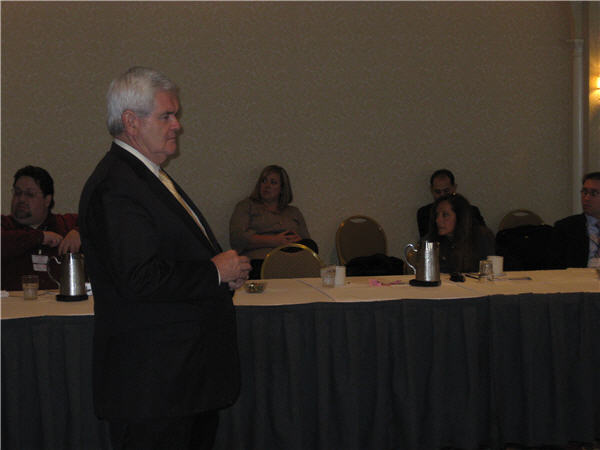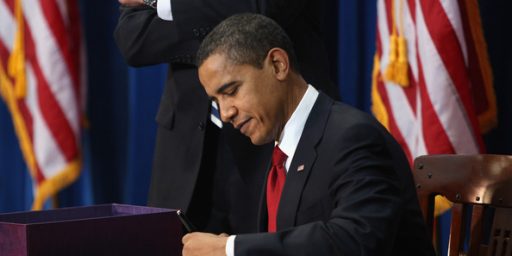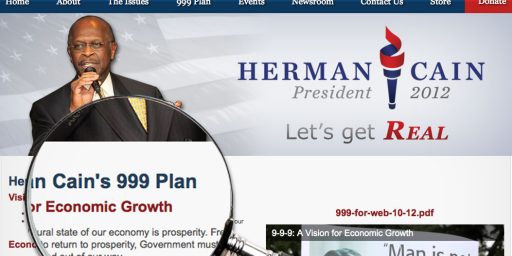Newt Gingrich at CPAC
I attended a breakfast this morning with Newt Gingrich as part of the rollout for the American Solutions Winning the Future effort. As usual, he was an extremely forceful speaker and passionate strategist.
He opened by saying that he is an optimist and that “President Obama is doing us a huge favor” by showing how “radically different” the Left’s ideas are from those of conservatives.
He noted, for example, two polls showing that between 77 percent and 80 percent of Americans oppose “giving one more penny to GM.” He said that it was a foundational idea of the country, articulated by Captain John Smith to the aristocrats at Jamestown that “He who will not work will not eat” and that the current policies are trying to overturn that basic ethic. The Declaration of Independence articulates “the right to pursue — an active, responsible verb — happiness,” not a guarantee of achieving it.
Gingrich dubbed the current bailout ethic “the Bush-Obama” plan and argued that conservatives must articulate an articulate vision. Republicans’ job is not to simply be an opposition party but rather a “better solutions party.”
He believes the massive stimulus plan gives us an opportunity for a “clarifying national dialog.” To win, the Speaker argued, we need ideas that are both popular and that work. Given how many issues there are to fight about, then, it makes sense to pick ones where there’s already a strong reservoir of good will — “tripartisan” ideas that 80 percent of people listening to drive time radio would agree with.
Here’s his 12 point alternative plan:
- Payroll Tax Stimulus. With a temporary new tax credit to offset 50% of the payroll tax, every small business would have more money, and all Americans would take home more of what they earn.
- Real Middle-Income Tax Relief. Reduce the marginal tax rate of 25% down to 15%, in effect establishing a flat-rate tax of 15% for close to 9 out of 10 American workers.
- Reduce the Business Tax Rate. Match Ireland’s rate of 12.5% to keep more jobs in America.
- Homeowner’s Assistance. Provide tax credit incentives to responsible home buyers so they can keep their homes.
- Control Spending So We Can Move to a Balanced Budget. This begins with eliminating Congressional earmarks and wasteful pork-barrel spending.
- No State Aid Without Protection From Fraud. Require state governments to adopt anti-fraud and anti-theft policies before giving them more money.
- More American Energy Now. Explore for more American oil and gas and invest in affordable energy for the future, including clean coal, ethanol, nuclear power and renewable fuels.
- Abolish Taxes on Capital Gains. Match China, Singapore and many other competitors. More investment in America means more jobs in America.
- Protect the Rights of American Workers. We must protect a worker’s right to decide by secret ballot whether to join a union, and the worker’s right to freely negotiate. Forced unionism will kill jobs in America at a time when we can’t afford to lose them.
- Replace Sarbanes-Oxley. This failed law is crippling entrepreneurial startups. Replace it with affordable rules that help create jobs, not destroy them.
- Abolish the Death Tax. Americans should work for their families, not for Washington.
- Invest in Energy and Transportation Infrastructure. This includes a new, expanded electric power grid and a 21st century air traffic control system that will reduce delays in air travel and save passengers, employees and airlines billions of dollars per year.
This, certainly, would have been a more compelling alternative than we had last November.







So the question is how do conservatives rally behind these proposals with enough force to move the Republican party inline with them? These are obviously good ideas and solidly conservative but they have also been around a while. How do we make them central to our message and then get that message out strongly?
We have a huge fight on our hands to stop the Obama plan and save the country. Positives proposals and policy initiatives have to be get to the public and the Party must be united behind them. Libertarians should set aside their differences with the Republicans and unite to stop the plan before it gains momentum.
Our choices are more clearly defined post campaign and I believe most Americans are feeling buyers remorse with this president. Congress is the key to stopping this plan and I expect centrist and conservative Democrats are the key in Congress.
I know if I learned anything the last eight years, it was that our chief problem was insufficient tax cuts.
This is a former movement.
This is at least a different angle. First, almost everyone agrees that cutting the payroll tax temporarily would be an effective stimulus, since it gets money into the hands of the working class. Second, our business tax rates are higher than in several other major countries, creating an incentive to export jobs.
No offense, but this list is nothing but a bunch of tax cuts and then a hand-waving “spend less”. Eliminating the 1.2% of the budget that is earmarks will not offset the elimination of hundreds of billions in tax revenue.
Need a better plan, sorry.
By the way, I agree with at least half of the points. But there’s no fiscal responsibility here. I agree with points 7 and 12, but they themselves will spend all the money saved in point 5. And again, the rest is simply “more tax cuts,” even though I agree with at least point 1.
John, I’ve opposed the “Bush tax cuts” on the grounds that, while some kind of tax cut was politically necessary, those were the wrong tax cuts. I think that, for example, reducing the business income tax is one of the right cuts. On the other I’m not as convinced about the inheritance tax or further flattening the marginal rates.
Unfortunately, I see no fiscally responsible way of doing the right things at this point.
You’re kidding me, right?
The “alternative” to Bush’s tax-cut failure is a “cut every tax in sight” plan?
(you had me at “articulate a vision” but lost me when it became a re-run of “that 90’s show.”)
Here you all go again wringing your hands about tweaking the tax code. Have any of you studied The Fair Tax?
How much incentive are we giving, and how much would we have to cut in order to reduce that incentive significantly? And just how well is the job export to Ireland business going?
Are there any conservatives left that will still say that Bush was a good President? Not too long ago they were easy to find, now, not so much.
Really? Isn’t it exactly the same? Tax cuts–no earmarks–drill, baby, drill. Just a slightly more energized message delivery.
Although I must say that until Newt told us, I had no idea that fraud at the state level was a national problem. I’m curious whether this is all states or just ones with Democratic governors.
That’s because now conservatives see how badly Bush tarnished the brand. Newt’s ideas are all solid conservative solutions which beat the progressive policies by a long shot- and these are ideas that would be receive little opposition in a normal economic downturn (except that he’s being bold in the degree that he’s proposing, but that would be expected due to the scope of our problems.)
But the ideas can’t gain traction because all we hear is “that’s what Bush did.”
Yet, the fact that Bush also ran up deficits doesn’t give liberals pause when proposing logarithmic jumps in deficit spending. That part still seems logical to them for some strange reason.
Well-people saw it for what’s worth- tax cuts stated in different ways plus repeal Sabarnes-Oaxley (to repeat Enron?)- what did I miss- oh yes-we need more energy. And this a plan? HAHAHA.
I’m a big fan of Newt and I like that he proposes concrete, detailed alternative proposals. That said though, I don’t think that’s where the focus of the conservative message should be. I think the comments here bear me out in that a lot of people have buyers remorse about electing unchecked liberal government, but the opposition isn’t united around any one set of alternative ideas.
I do think though, the GOP should focus on crafting the opposition message in particular ways to resonate with the maximum number of people, and then worry about rallying them around specific governing principles after they’re on the hook. The Democrats didn’t get back in power by proposing the specific policies they’re now enacting, they got in by the method that I describe.
Here’s an example of how I think the messaging should be done; I think it’s imperative to start framing the economic discussions in ways that everyone can understand. So, since everyone now sees the fallacy of homebuying practices and why people got burned, use that as an analogy for what Obama’s now doing with his budget. Millions of people got burned because they tried to buy more house than they could afford, based on future equity they were told they could assume would be there when it came time for the adjustment of rate of the 5 yr ARM. This is precisely what Obama’s budget prestidigitation requires- and assumption that the economic recovery will be well underway when his tax hikes go into effect. I think making that analogy makes it clear to most people that we can’t keep making best case scenario guesses about future prosperity.
When explained to people in that way, it no longer sounds like an empty partisan attack, and the fact that it doesn’t necessarily explain an alternative policy doesn’t matter. It simply becomes clear that the status quo isn’t teneble, and that’s the first step toward getting people to even listen to conservative ideas again.
Wow, more of the same that got us into the mess we are in.
These policies just generated the weakest economic expansion in history and the only time in the post WW II era when the GDP GAP was not closed or the percent of the working age population employed failed to surpass the previous peak.
Don’t you guys realize that the reason Obama is president is that these policies failed, failed, failed.
Not good enough. Temporary tax cuts produce little or not stimulus. We saw that with the “stimulus checks” that were sent out a few months ago. Most of them were used to increase savings (note that to the extent that debt is “negative savings”, paying down debt increases savings).
Two points,
1. Color me skeptical on the governments ability to determine who is “responsible”.
2. We have a situation where the housing market is trying to adjust to the new economic environment, delaying that may very well delay the “pain”.
Fraud and theft I imagine are minor. What is the problem is that you are creating an incentive problem. To the extent that various states are in trouble for being budgetarily profligate anti-fraud/theft is the wrong thing to focus on. Requiring states to return to sustainable budgetary growth paths is the answer.
Christ, the Republicans are going sit out the next election cycle too I guess. When having a solid and decent opposition is most needed they go teh stupid on us.
I’ve read a lot of comments referring to “more of the same”. Well, no, it’s not. We have heard these ideas before but never really pursued them properly. These policies did not get us into this mess, Barney Frank’s policies got us into this mess more than low taxes and less government.
Low taxes are good for us and lower spending is good for us. Some of the tax cuts proposed have more to do with the immoral nature of the tax. Some of the tax cuts stimulate the economy. Either way those tossing aside tax cuts as failed policy are wrong.
What’s up Jeff’s butt?
@JJ:
I suspect health costs lead tax rates in the list of incentives.
Steve Plunk, wasn’t the flaw in the Bush administration’s version of “I don’t care as long as I get my tax cut” that they didn’t cut spending in a nominally growing economy. They spent pro-cyclical, while tax cutting counter-cyclical.
Now we are in a record contraction (everyone accepts that). Cutting now and on a temporary basis would be counter-cyclical. You could make it up later with tax increases when the recovery comes.
Is Gingrich actually proposing that? Or is it “this 90’s show” with tax cuts proposed in summer and in winter, no matter?
James, the fact that the “death tax” is even in the top 12 of GOP priorities right now should signal the utter intellectual bankruptcy of the movement. It is over.
There are tons of things conservatives could propose that would be welcomed by the public and conservative. Hell, off the top of my head, proposals to streamline and/or standarize the paperwork related to workman’s comp would be a massive advantage to businesses, would be very popular, and would help with job creation. But that kind of thinking could never even happen because the Republicans are still too busy pretending they care about states rights (in between leading raids on medical marijuana outfits).
What does Newt bring? A platter of tax cuts. This is a joke.
Odo,
One of the problems Bush faced was how to cut spending during a war. A war that not only cost cold cash to execute but a war that threatened energy supplies and drove up the price. Tax cuts during that time held off an economic downturn. There was no true economic stability post 9-11. Even now there is none.
John Cole,
Not being in the top 12 makes the movement intellectually bankrupt? There’s an awful lot of things to be taken care of in this country beyond the first 12 so are they not important? It’s more complicated than you admit.
As an employer (with a lot of claims) I can tell you with certainty your idea about streamlining workers comp paperwork is not a priority for business. Not even in the top 50. And how would that create jobs? With respect sir, that idea is not serious. It looks more like an idea coming from the public sector.
I’m also curious where the idea Republicans were gung ho for raiding medical marijuana outfits. I thought only the bay area cared about that one anymore.
The point being that of the top 12 ideas Gingrich is advancing, half are little more than tax cuts.
Also, I bet a number of businesses would appreciate some relief from workman’s comp paperwork. It is a constant source of kvetching around here. Regardless, you are once again missing the point, which was surely there must be ideas beyond tax cuts that could reach the top ten of priorities. I just threw that in there as an example. By way of comparison, look at the original contract with America. Notice that there are actual ideas there beyond tax cuts?
Finally, of course federal raids of state licensed medical marijuana are a.) in the provenance of Republican concerns and b.) a violation of the clearly malleable states rights they seem to trumpet. Fortunately that is finally coming to an end.
Again, this offering from Gingrich was a bad joke.
That’s true Steve P, there was a war, and wars usually run deficits. That said, we were told at the time that the war was run on 100% financing (interest-only warfare!). That was a choice.
BTW, since this ties in … I was saying earlier today: “I don’t fault the Bush II administration for making it happen, but I fault them for being on-watch and missing it .. more than missing it. Their policies goosed the bubble higher, making the crash harder.”
Greenspan’s cheap money and Bushes tax cuts … healthy stimulus or fuel for a fire at that point?